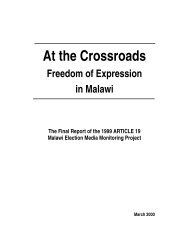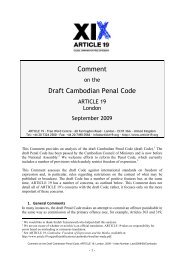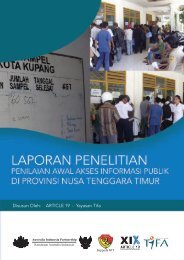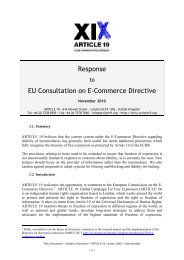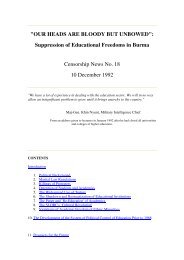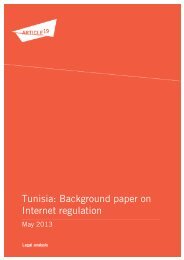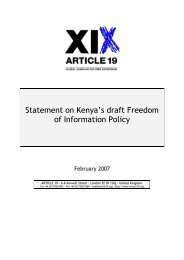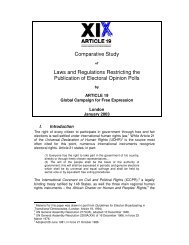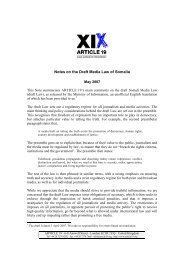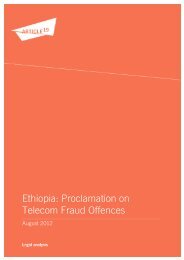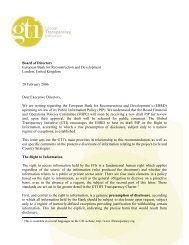FOR INTERNAL USE ONLY - Article 19
FOR INTERNAL USE ONLY - Article 19
FOR INTERNAL USE ONLY - Article 19
- No tags were found...
Create successful ePaper yourself
Turn your PDF publications into a flip-book with our unique Google optimized e-Paper software.
ARTICLE <strong>19</strong>GLOBAL CAMPAIGN <strong>FOR</strong> FREE EXPRESSIONof information often depends on the discretion of an individual official. Environmental bodies’ pressreleases and liaison with the media also need to be enhanced.Ukrainian environmental NGOs have suggested that the low circulation of smallenvironmental publications may be addressed by starting an official newsletter, under the aegis of theMEP. This could publish EIAs, announcements related to the environment and other officialinformation. It could be funded, in full or in part, by those who commission EIAs. Additional possiblemeasures could include the creation of open e-registers of EIAs. Such measures would also reduceappeals and litigation, cut publication costs and enhance public oversight of the implementation ofpotentially environmentally hazardous projects.Regulations on transparency in the operations of private businesses regarding fulfilling publicfunctions or holding public interest information are still underdeveloped in Ukraine, despite the factthat relevant basic legal provisions exist. The same is true for corporate social responsibility. A selfregulatoryapproach could lead to improved management and dissemination of information in thepublic interest. Nevertheless, there are examples of companies who make an effort to be moretransparent and carry out their work in a manner that minimises the harm to the environment andpublic health. One company identified this as part of a need to modernise and enhance theircompetitiveness in order to respond effectively to growing competition from Western Europe. If this isthe case, these tendencies will probably be replicated by other commercial enterprises. Yet, the shift inpractices will be a lengthy and complex process since many companies still use old Soviet-stylemanagement techniques and machinery that is not energy-efficient. Many smaller companies simplydo not have the funds to invest in research and development that can have a positive impact on theenvironment.This and other problems are exacerbated by the limited awareness of environmental issuesamong the general population. Although many people are acutely aware of the hazards posed byradiation, in reality only a minority is concerned about general environmental issues. This is a result ofthe lack of educational policies by the State, and the still (overall) limited media coverage ofenvironmental issues.Understandably, most people are primarily interested in environmental hazards that have adirect impact on their lives. Their need for information emerges in cases where their neighbourhoodsare threatened by the construction of environmentally hazardous facilities; the felling of trees andelimination of green zones near their homes; the excessive density of housing; or environmentalemergencies. In addition, people are frequently concerned about how poor environmental conditionsmight have an impact on their – often dire – financial situation. In these cases, people may requestinformation from State bodies, but the bureaucratic obstacles are at times so daunting that they preferFor Internal Use Only. Is Post-Chornobyl Ukraine Ready for Access to Environmental Information?ARTICLE <strong>19</strong>, London, 2007*'



